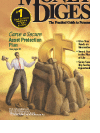Publication
Article
Physician's Money Digest
Evaluate the Performance of Index Funds
Author(s):
I n recent years, considerable attention hasbeen paid to index funds as a low-costinvestment strategy. These funds can bemanaged by a computer to mimic the performance,minus the fee, of any index, such as theS&P 500, Russell 3000, Semiconductor,Biotech, Dow, etc.
If you're in the clutches of a stockbrokerwho earns their living churningyour account as much as possible tomaximize commissions, the transactioncosts can eat up a big percentageof your performance. Many peoplefound that their broker was makingmoney as they were losing money.Thatcircumstance has made a low-fee investmentalternative like index fundsseem attractive. Many financial guruschampioned index funds for years,claiming that the indexes were outperformingmost active managers, so whypay the fee? Like every other investmentcategory, they're good while theywork. The gurus were temporarilyright, but have been wrong the pastcouple of years.
WHEN THE BEAR BEGAN
Most investors believe the bear market commencedwith the sharp 40% collapse in theNasdaq in March 2000. However, for a year or2 before that, the vast majority of S&P 500stocks were declining even as the averages weregoing up. Smart portfolio managers were consideredincompetent if they didn't own themagic 30 or 50 stocks that kept charging higher(eg, Enron, Intel, Microsoft, Cisco, Oracle,Amazon, Tyco, WorldCom, Qwest, Lucent,Nokia, Applied Material, etc).
Everyone embraced those stocks, no matterwhat the companies' multiple of earnings orridiculous business plans were, because if theydidn't, their performance looked paltry and theirclients left. What a ridiculous game of musicalchairs it became, until, 1 by 1, the big winnersbegan to falter and fall by the wayside. Most ofus were unaware of the outrageous things goingon within some of these corporationsthat we now know with perfect hindsight.Even so, it was hard not to beswept up in the mania.
BEAR'S MARCH HALTED
Almost everybody lost money inthe stock market from 1999 to 2002. Itwas hard not to.To be at the top of thebarrel for a 5-year performance now,you need annualized stock marketlosses of only 1%. No matter whichroute you followed, value or growth,riding the Nasdaq bucking bronco oralongside the oracle Warren Buffettowning Berkshire Hathaway, your 5-year returns are just about nil. Mostinvestors have lost their gains of thepast 5 years and are back to wherethey were in 1998, but have not lost allof their 1990's gains.
The bear market ended in October2002. Since then, it's been a good time to sellthose and return to the stock market. In April,when 84% of investors were bullish on bondsand only 16% liked stocks, it was a perfect entrypoint. The stock market is up dramatically sincethen. The easy first 50% has been made, butwe're still dramatically below the 5100 peak ofthe Nasdaq and the Dow's 12,000 peak.
I don't know when we will return to those levelsor how many years it will take. I do know thatstocks are far more likely than bonds to be yourfriends in the next few years. Interest rates arenow heading in the wrong direction for successfulbond investments. Just look at all the bondfunds that were marketed to the investment publicthis past spring so the mutual fund companiescould capitalize on those who were once againchasing last year's winner. Give the investmentpublic what it wants, even if it's bad for them inthe long run. These are the same folks whoowned Tyco, Enron, and WorldCom in theirportfolios and are now peddling "corporateresponsibility" funds.
DOW JONES DIRECTION
The markets didn't go down in a straight lineand they aren't likely to go up in a straight line.We can all hope that some level of sanity hasreturned to investors' expectations of what is areasonable annual rate of return on their investments(8% is the long-term average).
A carefully selected portfolio of stocks is thebest way to mend the damage to your portfolioas you look to the future and plan for retirement.You can rest assured that you will never repair itowning bonds. Active managers have beaten thepants off index funds in the past couple of years,even after the large fees. Open Barron's or yourlocal Sunday paper and compare the 2003results of the better-performing investment managerswith the S&P 500 or the Russell 3000, evenafter their fees are included. You'll be in for a verypleasant surprise. Sometimes, intelligence surpassescomputing power, particularly at timessuch as these, when thorough investmentresearch offers its own rewards.
Joan E. Lappin is presidentof NYC-basedGramercy Capital, whichhas been ranked number1 in Nelson's Directoryof Registered InvestmentAdvisors. Gramercywill be hostingan investment seminarat the New York YachtClub in Newport, RI,in mid-July and againin August.To reserve aplace or for questionsor comments, call 212-935-6909 or e-mailjlappin@gramercycapital.com.
